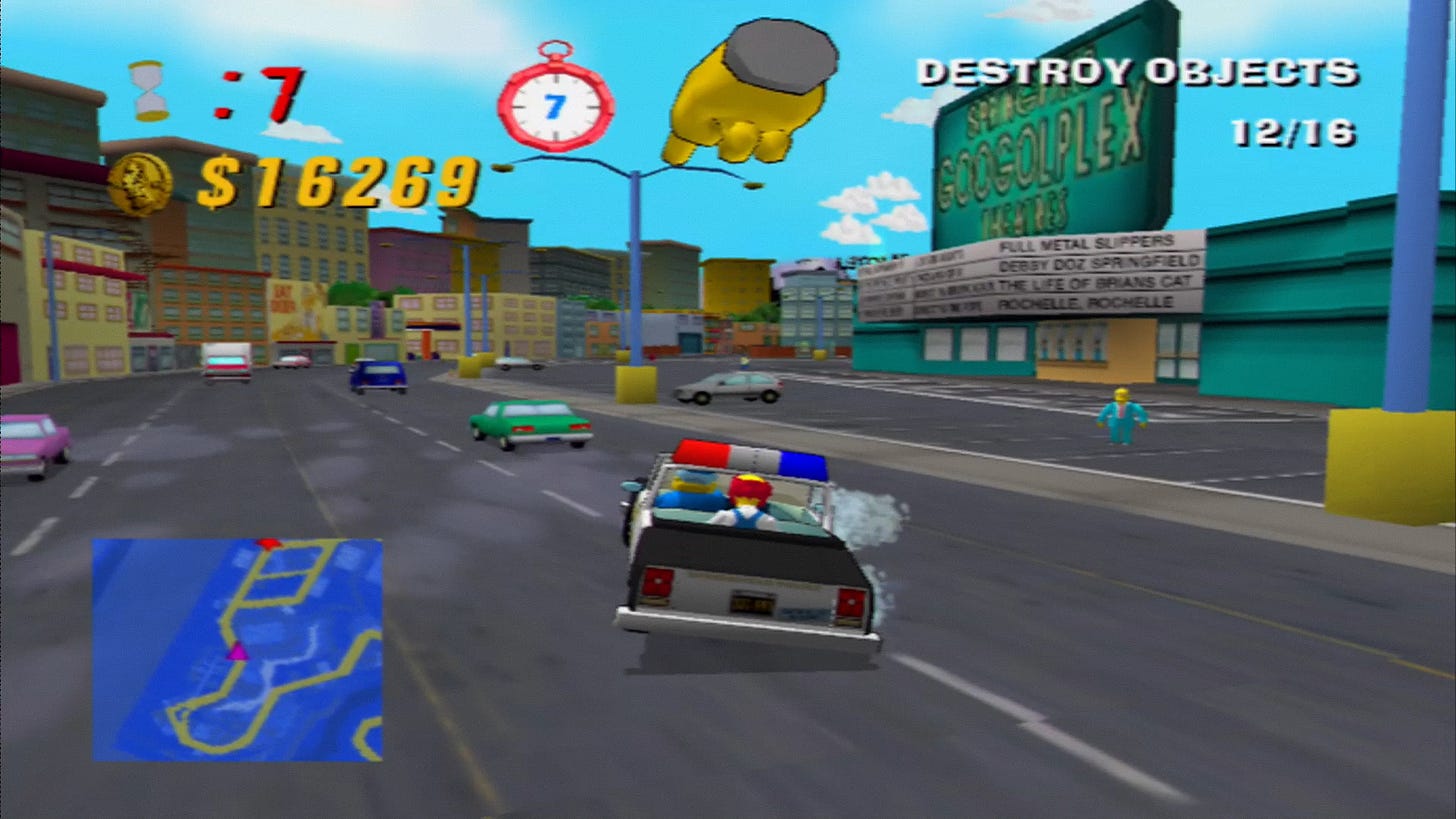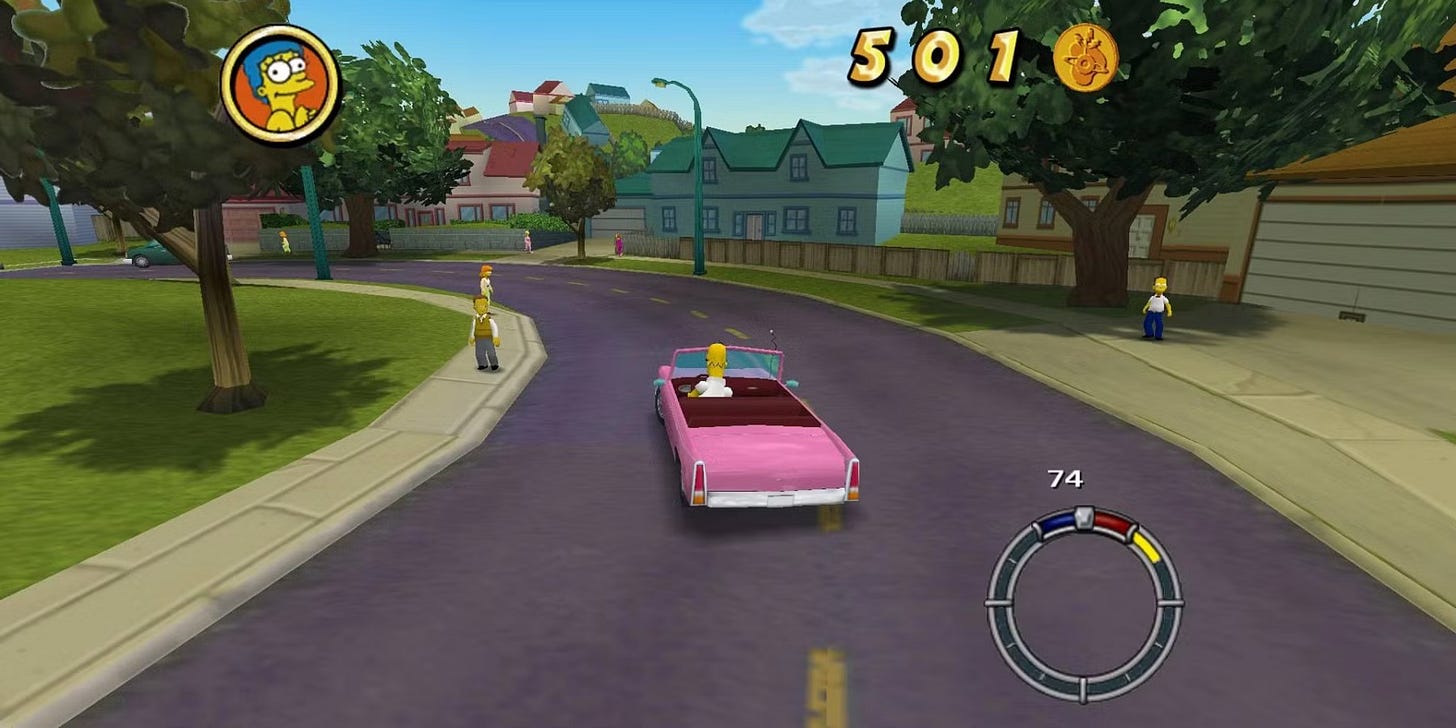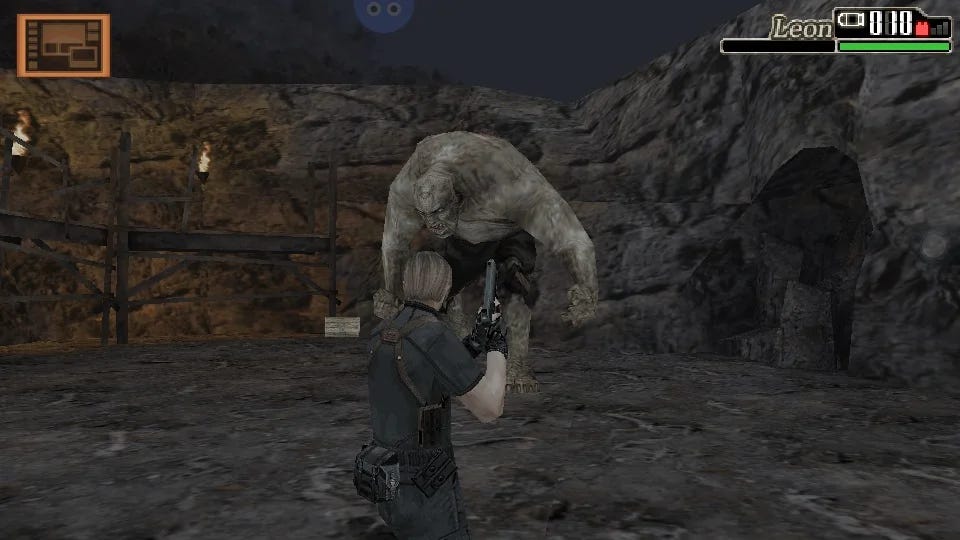From dollars to doughnuts: how the astounding longevity of The Simpsons: Hit and Run has brought abandonware in vogue
Doh-n't shoot the torrenter, they're just late to catch the stream.
In the heyday of tie-in titles in the early 2000s, The Simpsons received its inaugural major interactive endeavour of the millennium in Road Rage - Wrestling notwithstanding, as the licencees would have preferred. Nevertheless, Radical Entertainment’s first foray into Springfield was a carbon copy of Sega’s Crazy Taxi - the latter sued Fox Interactive for a violation of its patent on the game’s mechanics. Though Road Rage featured the series’ characteristically irreverent humour, its derivative design hindered an otherwise amusing odyssey through the town; your clientele would be populated by a merry gallery of fan favourites.
Conceptually, The Simpsons does not appear to clear qualities apt for its translation into a video game. The middle-class malaise of the family - gradually lifted through a suite of celebrity cameos and heightened adventures, nonetheless - works best as an archetypal situational comedy. Thus, early adaptations were eclectic: an arcade brawler, a punishing platformer, and an interactive recreation of Springfield. Road Rage’s pivot to automobiles was a logical progression, not only in light of the gamified form and madcap popularity of its inspirator - or direct template, as Sega argued. Homer helped his half-brother Herb produce The Homer, before becoming the esteemed Mr. Plough - not to mention the family’s proprietary pink sedan.
Road Rage did have one crucial element Crazy Taxi did not: being able to play as Groundskeeper Willie in a police car.
Though Road Rage was a commercial success, coasting to three million sales, its limitations were evident. Charting Springfield solely in a car, hindered by both a time limit and preset objectives, did not quite capture the ultimate imagination of a potential Simpsons simulation. Thus, Radical Entertainment’s second spin of their tyres led to Hit & Run: a satirical take on Grand Theft Auto III, though with an indelible personality of its own - gameplay mechanisms inclusive. Save for Maggie, players could control each member of the Simpsons family across a series of sequestered maps, charting a particular neighbourhood in Springfield. This served as a canny solution to the technical shortcomings of its hardware, ensuring each part of the city retained a tantamount attention to detail. Early on, you can drive through the underbelly of the power plant, touring the Stonecutter’s lair, before returning home to kick Flanders down the street. Yes, you can kick pedestrians with aplomb, earning the ire of Chief Wiggim and co. - a less visceral alternative to Grand Theft Auto’s arsenal of ammunition.
Hit & Run accumulated a total of seven million sales to its name, affirming itself as an effective iteration upon Road Rage’s modest ambition. However, for its contemporaneous universality, the game gradually became lost to time. Though it received a port to Windows, it was never made available on digital storefronts; neither Steam nor Good Old Games. Moreover, after Electronic Arts won exclusive interactive publishing rights to the series in 2005, its sequel was quietly shelved. Their pact with EA yielded The Simpsons Game, designed to compliment the release of its feature film adaptation, and Tapped Out, which is scheduled to ride into the sunset this coming January.
The Simpson family must combat extraterrestrial threats within their serene slice of suburbia - don’t blame me, I voted for Kodos.
Nevertheless, as the medium drifted further from its coveting of licenced titles, Hit & Run became a curio: a lingering piece of ephemera resigned to the depths of one’s cupboard, the heights of their attic, or the shelves of a thrift store. Ironically, a game designed for mass market appeal became principally inaccessible. However, in the bowels of a tenuously legal lazarus pit, Hit & Run was slowly reclaimed by the abandonware community: a series of initiatives designed to preserve titles lost to time. Though this model of underground distribution is tantamount to piracy, it is an ethical practice: if a game is not featured upon a storefront, then its commercial standing is null and void. Thus, if it is not regarded as a marketable product, the onus is upon the audience to play the role of the publisher, procuring it through their own means.
“"Is it piracy? Yeah, sure. But so what?”
“Most of the game makers aren't living off the revenue from those old games anymore. Most of the creative teams behind all those games have long since left the companies that published them, so there's no way the people who deserve to are still making royalties off them. So go ahead--steal this game! Spread the love!
Tim Schafer, 2002
Consequently, if the team behind a title are barred from receiving royalties, the most righteous manner of compensation is through keeping their work alive. This practice has produced fan reclamations of titles essential to the medium’s canon - namely Silent Hill 2, enhanced to achieve crisp fidelity to a standard greater than its original release. Conversely, those curious can experience the Zeebo, IOS, or Wii ports of Resident Evil 4 within the confines of their computer; charting each interpretation is a worthy, if not odd exercise in compromise and creative licence. For those of my generation, raised within the golden age of tie-in titles, websites hosting abandoned games provides us with an opportunity to recapture the uncomplicated bliss of this era - from a surprisingly sound tour of The Incredibles to its now non-canonical successor. There is a saccharine catharsis to mimicking the manual process of installing a game from a CD via an ISO mount; bypassing the streamlined process Steam proposes in favour of finicky files gives Kung-Fu Panda a greater sense of character.
Resident Evil 4’s port to the Zeebo weighed in at a meagre 7mb, clearing up Leon’s inventory for additional weaponry.
Hit & Run’s underground distribution has eventuated in two splintered factions: those faithful to the original recipe - particularly in Donut Team, its preeminent modding community - and those stridently committed to remaking the game. Regarding its remakes, YouTubers Reubs and El Gato Del Tejado chronicled their progress in recreating the game - the former used Unreal Engine 5 to faithfully upgrade its textures, lighting, and mechanics, whereas the latter revised its cutscenes in the traditional 2D animation of the series. Each emblematise the enduring shorthand of the game, serving as exhaustive exercises in technical wizardry reserving mainstream appeal. Though its deceptive sparseness became evident through Reubs’ project, an unintentional echo of the Grand Theft Auto trilogy’s definitive editions, Donut Team’s devoted community devoted itself to elaborating upon its design through intricate mods - through both aesthetic and narrative means.
The Donut Mod series, in particular, enhanced the original campaign through a number of novel flourishes: new levels inclusive. Additionally, players may download a mod unifying all three stages, permitting smooth transitions between the map and their corresponding missions. Should you desire a detour from the Simpson family’s narrative, you can assume the role of Moe Szyslak in his fight against the mob; seven custom missions await! Through these appendages, the core gameplay loop remains integral: whimsical, madcap dashes through a tenured representation of the town, allowing for outrageous ordeals between a fair breadth of the series’ supporting characters. The longevity of this title rivals The Simpsons’ own, though without the official support of a major network, nor a commercial conglomerate in Disney. That a game conceived in the earliest days of the sixth console generation and Windows XP is a fanatical fixture of modern hardware is an endorsement unto itself. Evidently, the intoxicating verve of nostalgia is capable of eliciting the collective imagination of aspirant developers.
Moe missions, Moe problems.
Ultimately, the persistent liveliness of Hit & Run is best characterised through its standing as a statement: a request for publishers to revisit the trove of tie-in titles of old, which comprised a cottage, if not metropolitan industry once enough to support an entire studio. Curiously, Spongebob Squarepants: Battle for Bikini Bottom - Rehydrated is the lone emissary of nautical nonsense from this era to have entered the modern day in a flashier form; its sales count would be bested thrice, if not four times over by a repackaging of Hit & Run for this current generation. Through the unified efforts of Donut Team’s devoted community, an analogue game from a 4:3 age has evolved into a 16:9, live-service title - destined to outlast Tapped Out, despite being nine years its senior. Indeed, a noble spirit embigggens abandoned games.






I'm surprised Abandonware is still holding on. Many people still don't realise that industry associations like the ESA (which owned E3) routinely cease-and-desisted these fan-run sites without much care for the consequences and lost gaming history.